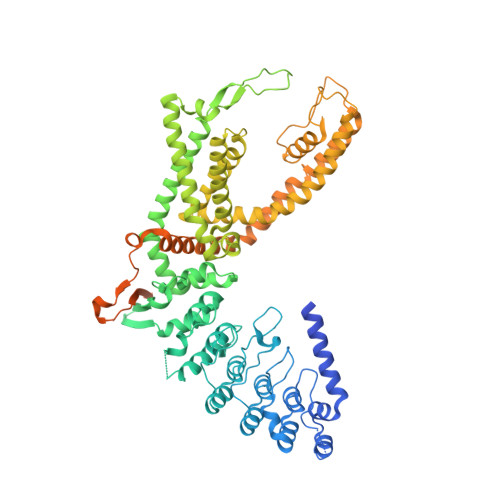Molecular details of ruthenium red pore block in TRPV channels.
Pumroy, R.A., De Jesus-Perez, J.J., Protopopova, A.D., Rocereta, J.A., Fluck, E.C., Fricke, T., Lee, B.H., Rohacs, T., Leffler, A., Moiseenkova-Bell, V.(2024) EMBO Rep 25: 506-523
- PubMed: 38225355
- DOI: https://doi.org/10.1038/s44319-023-00050-0
- Primary Citation of Related Structures:
8FFL, 8FFM, 8FFN, 8FFQ - PubMed Abstract:
Transient receptor potential vanilloid (TRPV) channels play a critical role in calcium homeostasis, pain sensation, immunological response, and cancer progression. TRPV channels are blocked by ruthenium red (RR), a universal pore blocker for a wide array of cation channels. Here we use cryo-electron microscopy to reveal the molecular details of RR block in TRPV2 and TRPV5, members of the two TRPV subfamilies. In TRPV2 activated by 2-aminoethoxydiphenyl borate, RR is tightly coordinated in the open selectivity filter, blocking ion flow and preventing channel inactivation. In TRPV5 activated by phosphatidylinositol 4,5-bisphosphate, RR blocks the selectivity filter and closes the lower gate through an interaction with polar residues in the pore vestibule. Together, our results provide a detailed understanding of TRPV subfamily pore block, the dynamic nature of the selectivity filter and allosteric communication between the selectivity filter and lower gate.
- Department of Systems Pharmacology and Translational Therapeutics, Perelman School of Medicine, University of Pennsylvania, Philadelphia, PA, 19104, USA.
Organizational Affiliation:



















